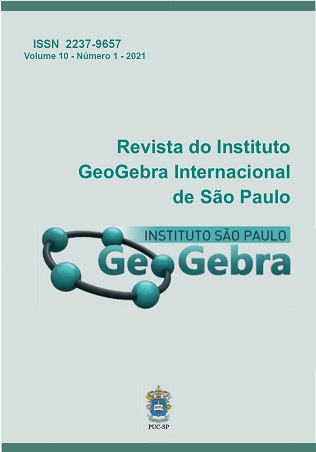Angle classification through a story in support classes for students with learning difficulties
DOI:
https://doi.org/10.23925/2237-9657.2021.v10i1p019-048Keywords:
Professor-researcher, Exploratory Teaching, GeoGebra, Design Methodologies, Hypothetical Learning Trajectories, SemioticsAbstract
This work appears in the course of the action-intervention in which there is an analysis of the difficulties experienced by students, in the 5th year, in the context of curriculum support in mathematics. During this process, a qualitative research was developed, where a teaching experience is developed based on a hypothetical learning trajectory previously defined by the teacher-researcher and discussed with the researcher involved in the intervention. The teacher in charge of monitoring the students' curricular support, as a teacher-researcher, formulates one or more hypotheses to guide the path of his students, outlining an intervention plan, being analyzed and discussed in the ongoing analysis guiding the investigation. The GeoGebra software emerges as one of the learning mediators, stimulating the development of communication, geometric thinking and mathematical reasoning of the students participating in the study. The description of the intervention, as well as the results of the study are presented in the final considerations.References
DE ASSUMPÇÃO, Paula Gabrieli Santos. PERÍMETRO E ÁREA: UMA ENGENHARIA DIDÁTICA UTILIZANDO O GEOGEBRA SOB O OLHAR DAS REPRESENTAÇÕES SEMIÓTICAS. 2015. Tese de Doutorado. UNIVERSIDADE FEDERAL DE SANTA MARIA.
BELL, Judith. Como realizar um projeto de investigação. Lisboa: Gradiva. 1993.
BOGDAN, Robert; BIKLEN, Sari. Investigação qualitativa em educação: uma introdução à teoria e aos métodos. Porto editora, 1994.
CANAVARRO, Ana Paula. Ensino exploratório da Matemática: Práticas e desafios. Educação e Matemática. APM, Lisboa 2011, pp. 11-17.
COSTA, Fernando Albuquerque. A utilização das TIC em contexto educativo: representações e práticas de professores. 2008. Tese de Doutorado.
COUTINHO, Clara P. et al. INVESTIGAÇÃO-ACÇÃO: METODOLOGIA PREFERENCIAL NAS PRÁTICAS EDUCATIVAS. DIRECTOR-EDITOR, v. 13, n. 2, p. 355, 2009.
FARIA, Eduarda Maria Gonçalves Ferreira Leite. O estudo do meio como fonte de aprendizagem para o ensino da história: concepções de professores do 1º CEB. 2007. Tese de Doutorado.
FRANÇA, Rômulo Martins; REATEGUI, Eliseo Berni. SMILE-BR: aplicação de conceitos de gamificação em um ambiente de aprendizagem baseado em questionamento. In: Brazilian Symposium on Computers in Education (Simpósio Brasileiro de Informática na Educação-SBIE). 2013. p. 366.
LEE, Haksu; DOH, Young Yim. A study on the relationship between educational achievement and emotional engagement in a gameful interface for video lecture systems. In: 2012 International Symposium on Ubiquitous Virtual Reality. IEEE, 2012. p. 34-37.
LAKATOS, Eva Maria; MARCONI, M. de A. Técnicas de pesquisa. 5ª edição. São Paulo, Altas, 2002.
MARÔCO, João et al. PISA 2015. Portugal. Literacia científica, literacia de leitura & literacia matemática, v. 1, 2016.
PEREIRA, Adriana Lenho de Figueiredo. As tendências pedagógicas e a prática educativa nas ciências da saúde. Cadernos de Saúde Pública, v. 19, p. 1527-1534, 2003.
POMBO, O.; LEVY, T.; GUIMARÃES, H. A Interdisciplinaridade: Reflexão e Experiência, Lisboa: Ed. Texto, 2ª edição revista e aumentada. A interdisciplinaridade. Conceito, problemas e perspetivas-excerto em pdf). http://www. educ. fc. ul. pt/docentes/opombo/mathesis/interdisciplinaridade. pdf, p. 8-14, 1994.
PRENSKY, Marc. Digital game-based learning. Computers in Entertainment (CIE), v. 1, n. 1, p. 21-21, 2003.
PÉREZ, G. Investigación Cualitativa–retos e interrogantes–I Métodos. (p. 124). Madrid: Ed. Muralla, 1998.
SERRAZINA, Lurdes; OLIVEIRA, Isolina. Trajectórias de aprendizagem e ensinar para a compreensão. O professor e o programa de matemática do Ensino Básico, p. 43-59, 2010.
SILVA, Bento Duarte da. O contributo das TIC e da Internet para a flexibilidade curricular: a convergência da educação presencial e à distância. 2000.
SILVA, I. B. O pensamento complexo e a educação. Ponto e vírgula, v. 11, p. 28-53, 2012.
SIMON, Martin A. et al. Towards an integrated theory of mathematics conceptual learning and instructional design: The Learning Through Activity theoretical framework. The Journal of Mathematical Behavior, v. 52, p. 95-112, 2018.
SIMON, Martin A. Reconstructing mathematics pedagogy from a constructivist perspective. Journal for research in mathematics education, v. 26, n. 2, p. 114-145, 1995.
FITA, Enrique Cártula; TAPIA, Jesus Alonso. A motivação em sala de aula: o que é, como se faz. São Paulo: Loyola, 2004. p.148.
VASCONCELOS, L. A. Uma Investigação em Metodologias de Design. 2009. Tese de Doutorado.
XAVIER, Aline Freitas da Silva; ALMEIDA, Marcelina das Graças de; SONDERMANN, Danielli Veiga Carneiro. Uma Análise Histórica dos Métodos de Design Sob a Perspectiva do Design Social. Igualitária: Revista do Curso de História da Estácio BH, v. 1, n. 15, 2020.
Downloads
Published
How to Cite
Issue
Section
License
Submission, processing, and publication of articles sent to the journal and registration of the DOI at Crossref is free of charge.
Authors retain their copyright and grant the journal the right of first publication of their article, which is simultaneously licensed under a Creative Commons - Attribution 4.0 International license CC BY that allows others to share the article by acknowledging its authorship and initial publication by the journal.
The GeoGebra journal encourages its authors to register their work with information and communication management systems aimed at researchers, such as Academia.edu, Mendeley, ResearchGate, etc.


 10.23925
10.23925
